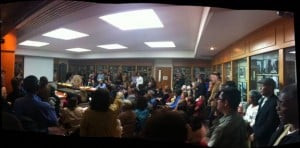
 The movement to increase transparency in the nation’s largest urban oil field gained some more momentum last Thursday night as over 100 community members who live, work, and play near the Baldwin Hills Oil Field packed into a small room to voice their questions and concerns about fracking. The atmosphere was electric and important progress was made. To get a recap of Thursday’s meeting, please read this article by Damon Nagami from the Natural Resources Defense Council: goo.gl/huiPr
The movement to increase transparency in the nation’s largest urban oil field gained some more momentum last Thursday night as over 100 community members who live, work, and play near the Baldwin Hills Oil Field packed into a small room to voice their questions and concerns about fracking. The atmosphere was electric and important progress was made. To get a recap of Thursday’s meeting, please read this article by Damon Nagami from the Natural Resources Defense Council: goo.gl/huiPr
As the standing-room-only crowd asked questions of the oil company, the County Government, and representatives from the State Department of Conservation it was very clear just how important and critical this issue is to the community.
To help support the efforts of the Greater Baldwin Hills Alliance and community groups in calling for transparency around matters affecting health, safety, and environmental justice including the Fracking Study, there are two important actions that you can do right now:
1. Email your questions and concerns about the Fracking Study to Rena Kambara ([email protected]) at the Department of Regional Planning by this Thursday March 15th at 5PM. Due to the overwhelming turnout at the meeting last Thursday, the County has agreed to take questions regarding the Fracking Study. They’re listening, are you talking?
a. You can view some of the presentations given at the meeting, including a PowerPoint discussing the Fracking Study at PXP’s website: www.inglewoodoilfield.com
2. Invite your friends, neighbors, and anyone concerned about fracking and/or oil field transparency to learn more about what they can do through the Greater Baldwin Hills Alliance campaign. To sign up for periodic email updates all they have to do is email me: [email protected]. Spread the word about what we’re doing in this campaign to anyone interested by mentioning it in meetings, at community gatherings, or even on Facebook and Twitter! As we’ve seen since our work began in 2008, change is possible, but only with energy and leadership from the community.


Coincidence or not? PXP donated $20,000 to the Culver City Education Foundation (“CCEF”) at the March 13 Culver City Unified School District (“CCUSD”) board meeting.
Puzzling or not? On the CCUSD website, all of the District’s donors were thanked, but the largest gift from PXP was not mentioned.
Critical information from another website:
If you’ve seen Gasland, you’re probably familiar with the hazards of the natural gas extraction process; look no further than states like Wyoming or Pennsylvania to see how the process can contaminate drinking water with toxic chemicals, cause hydrochloric acid spills, and trigger vegetation die-off.
Still, it’s easy to ignore the oil and gas companies’ egregious neglect of fracking safety when watching accidents happen from a distance. That’s why As You Sow, a non-profit that uses shareholder influence to pressure big companies into becoming more environmentally responsible, is trying to get the word out that fracking is relevant everywhere–because there is fracking everywhere. In fact, the practice has been taking place in California, completely unregulated, for the past 50 years. And since it’s unregulated, nobody really knows how many fracked wells there are in the state.
A lack of disclosure permeates the entire fracking process. The industry won’t disclose what chemicals it uses, it won’t test groundwater before, during, and after fracks, and in the case of California, it won’t even say where it’s fracking. “Oftentimes a company will frack a well, a person will say ‘My water is now poisonous,’ and the company says ‘Oh, it was like that anyway,'” explains Andy Behar, CEO of As You Sow.
Shareholder pressure from As You Sow (including 41% of shareholders at Chevron and 28% at Exxon), has yielded FracFocus , a website that Behar calls “minimal and very sketchy.” One key problem: The site only discusses wells drilled after January 1, 2011. As of 2007, there were 449,000 gas wells in 32 states.
Now As You Sow is pressuring the companies that drill in California, including Venoco and PDC Energy, to be more responsible. The first step in doing that that is to raise awareness. Last week, As You Sow held a fundraiser in Venice, CA to bring attention to fracking in the state. “People down in L.A. were shocked. When they saw pictures of it in Culver City and Santa Barbara, they were like, ‘Whoa, why don’t we know about this?'” says Behar.
A quick look at FracFocus tells us that there were seven wells drilled in California since January 1 of this year. A sample site in Ventura County uses chemicals including phenol-formaldehyde resin (harmful when inhaled or swallowed) and 2-butoxyl ethanol (a known carcinogen).
Even with all the shareholder pressure it can muster, there’s only so much that As You Sow realistically can expect from the companies that frack in California. “What I think will happen is that companies will do the bare minimum that we requested until they get so much pressure that they just can’t go on,” says Behar. “We’re going to start seeing revolts in local communities where this is happening.” Unfortunately, it might take a big fracking accident in California for residents to revolt enough to truly change the system.